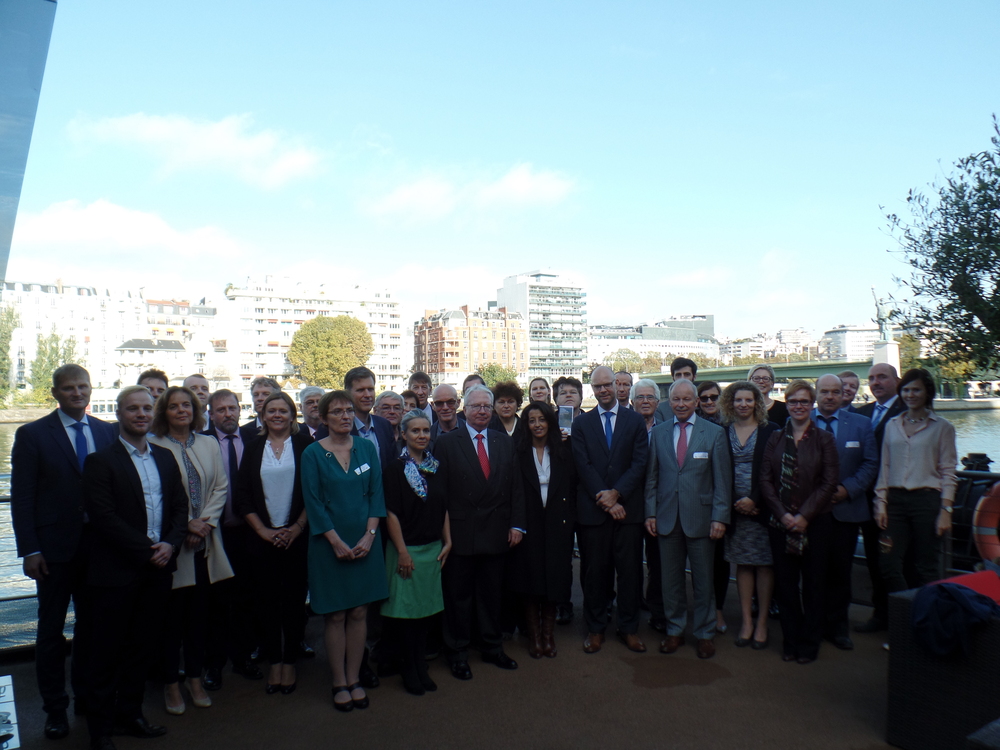EFIP members meet in Paris and welcome Kędzierzyn-Koźle Terminale Sp. z o.o. (PL) as a new member
Press Releases
13 October 2017
On 13 October 2017, EFIP members gathered in Paris (France) for their annual General Assembly meeting. The meeting was hosted by HAROPA-Ports de Paris, the first inland port in France and the second biggest in Europe.
Régine Bréhier, General Manager of HAROPA-Ports de Paris, said: “I am honoured to host the General Assembly of EFIP, gathering representatives from inland ports from 12 countries. EFIP is an important, strategic partner for us to strengthen our voice as ports and to raise awareness of the role of inland ports in multimodal logistics on the EU-level. Over the last two intensive days, I am very satisfied to have discussed and shared our experiences on themes such as inter-port cooperation, port clustering and crucial hinterland and waterway connections with other inland ports in Europe.”
During their meeting, the EFIP members discussed different (political) issues that are currently on the Brussels agenda. This included the main challenges faced by inland ports towards 2030 like the changing markets and new role of ports due to low emission mobility requirements, sustainable transport, alternative fuels strategy, circular economy, digitalisation and port-city relations. But also new EU financing programmes for inland port infrastructure and multi-modal connections were discussed. During the meeting, it was also stressed how important it is to obtain reliable data on inland ports and inland waterways. EFIP has picked up this challenge to gather more information in a structural way through the follow-up of the finalised PORTOPIA project. Besides, the 2017 European Inland Waterways and Ports event was highlighted that will take place in the European Parliament in Strasbourg on the 15th of November and is jointly organised with INE, EBU and ESO.
Kędzierzyn-Koźle Terminale Sp. z o.o. joins EFIP
During their meeting, EFIP members welcomed a new member: Kędzierzyn-Koźle Terminale Sp. z o.o. (PL). KKT is a private inland port for containers, dry and liquid bulk, located on the Oder river (E30 European water way) in Poland. The KKT port development will positively change logistics and support ongoing change in the transportation balance moving more cargo to the inland water transportation.
Jarosław Zemło, CEO of KKT Sp. z o.o., said "The Kędzierzyn-Kozle Terminals (KKT) will create via inland waterways a new gateway to the centre of Polish industry. The port, through its multimodal interconnectivity, will service all customers: local, regional and worldwide. We are sure that together with our European partners and the European Commission we will strengthen inland water transport as an ecological and energy-efficient transport solution and we are looking forward to cooperate on the EU-level on programmes that further develop existing and also new inland ports".
Clustering of ports and activities
The theme of the open session on Friday 13 October was “Clustering of ports and activities, crucial for strong future competitive position?”. This topic was discussed from three different angles. Firstly, the perspective of the ports was presented by Régine Bréhier, General Manager of HAROPA-Ports de Paris. She gave an in-depth explanation of the port cluster concept in practice, highlighting the example of the case of the Ports of Paris.
Secondly, Karima Delli, Chair of the Transport Committee in the European Parliament, explained the perspective of the Parliament. She discussed the strategic role of inland ports in future EU Transport and TEN-T networks policy and the challenges ahead. She said: “I would like to praise the efforts of the European Federation of Inland Ports, which has promoted for years multimodality and inland ports as important nodes for multimodal freight transport. Inland ports have and will continue to play a key role in the ongoing transition towards greener, smarter and better connected logistic. The Committee of Transport and Tourism of the European Parliament is very committed to secure a sufficient EU budget for transport after 2020, including CEF, and to fund an efficient multimodal transport network in which inland ports are playing an important part."
Finally, the point of view of the European Commission was discussed by Daniela Rosca, Head of Unit of Inland Waterways and Ports, DG MOVE. During her presentation, Ms Rosca explained the European agenda for inland ports towards 2020 and underlined the need of joining forces at all levels in order for inland ports to reach their full potential for connectivity, greening and digitalisation, attractive businesses and jobs. The 2018 Multimodal Year announced by European Commissioner Violeta Bulc is the perfect time to put inland navigation high on the political agenda.
These three perspectives came together in a general discussion in which members reflected on the question ‘Are we in need of a blueprint for port clusters and what are the key ingredients for successful, strategic inter-port cooperation?’.
“We have heard today about the unique model of port cooperation of HAROPA, involving both seaports and the Ports of Paris. Port cooperation is not just a trend, but it is becoming more and more the case on a European scale as an answer to maximise social, economic and public welfare for the region through joint activities. I believe we are not in need of a one-size-fits-all approach for inter-port cooperation as it can differ between the involvement of port authorities/terminal operators and it also depends on the trade corridor, port function and port location. But we definitely need more attention to this phenomenon on a European level“, summarises EFIP President Roland Hörner.

For further information, please contact: info@inlandports.be or check our website www.inlandports.eu.
Related documents
No attachments.